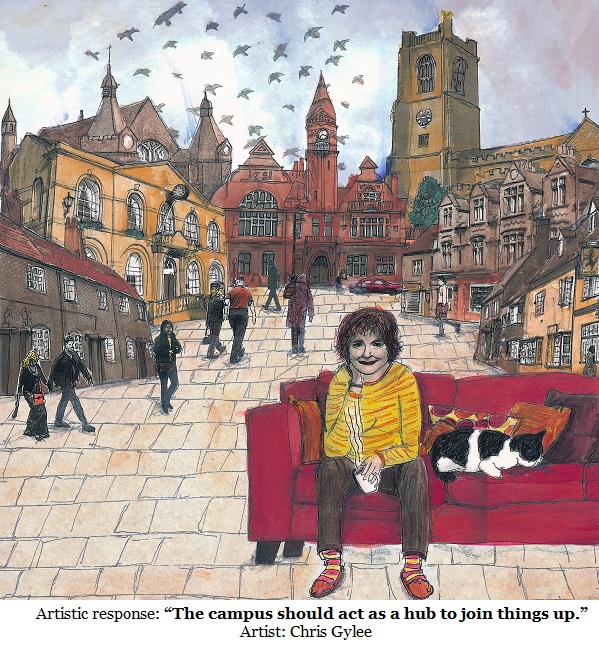 Seismic change is reshaping local government. Funding reductions from Westminster have prompted local authorities to reach up and across for economies of scale. The speed of institutional change has been astonishing: ‘Powerhouses’, new Combined Authorities, shared estate and shared functions between authorities have transformed the landscape. But how is local government reaching out to its communities? While planning strategically, how is it also devolving power to the people and communities from whom it draws legitimacy? Can local government be reshaped to ensure that citizens have a bigger role in taking decisions and taking responsibility for the places in which they live and work?
Seismic change is reshaping local government. Funding reductions from Westminster have prompted local authorities to reach up and across for economies of scale. The speed of institutional change has been astonishing: ‘Powerhouses’, new Combined Authorities, shared estate and shared functions between authorities have transformed the landscape. But how is local government reaching out to its communities? While planning strategically, how is it also devolving power to the people and communities from whom it draws legitimacy? Can local government be reshaped to ensure that citizens have a bigger role in taking decisions and taking responsibility for the places in which they live and work?
Based on in-depth engagement with Wiltshire Council and its communities over the last two and half years the RSA believes that change is possible; not, though, through isolated technical or legislative fixes. If the goal is people-shaped local government, change will need to be collaborative, reflective and patient. It will focus on improving connectivity – strengthening the relationship between local people and the services that are part of their lives (co-production); and, just as importantly, strengthening relationships between local people themselves, enabling them to exchange help and support ever more effectively (resilience).
Local authorities across the country are leading positive change. Integrated delivery and pooled or aligned place-based budgets can be the basis for a more joined-up conversation with local citizens. While many functions and services have been consolidated at scale, some have been pushed down to community level and reshaped in dialogue with those communities – a development also seen in health services. There has even been a modest devolution of powers to lower tier authorities, as districts and counties have transferred some functions and assets to Town and Parish Councils.
But much more needs to be done if localism is to be genuinely people-shaped, rather than managerially fixed. Leadership and creativity need to come from outside as well as within local government. The resources, reports and tools gathered here are therefore designed to be accessible and helpful to a wide range of people – interested citizens, community groups, social entrepreneurs, business leaders and community activists, alongside and as well as local authority leaders, officers, practitioners and decision makers.
Our work with Wiltshire Council
People Shaped Localism is the result of a three year learning partnership with Wiltshire Council. The RSA is grateful for the council’s support during this time.
Wiltshire Council has been introducing new multi-function facilities in community areas. These ‘campuses’ have been part of the Council’s commitment to strengthening communities. Local communities have been involved in decision making and have talked about the importance of services that feel joined up around them, and which they feel comfortable being a part of.
From March to July 2013, the RSA conducted a series of interviews about the Campus Programme. We spoke with a wide range of people, elected councillors, council staff in different departments, people who work within public services, people who work in charities, and people who volunteer in their local communities, asking the same questions of each.
We wanted to creatively communicate the aspirations and concerns voiced during these interviews and commissioned local and emerging artists to create a visual response to key statements. Each selected statement was one that had been mirrored by others as well so we knew it was something that many had expressed. We collected a wide range of visual approaches and interpretations that nevertheless remained true to the intent of each statement.
Some of these visuals are included in the following pages. Where they appear, they are termed ‘artistic response’ and we explain the underlying policy issues.
Volunteering: People to People Localism
Localism should start from the citizen and the community, and from the assumption that each can be active – creative – in meeting their needs and achieving their aspirations. In resilient communities, citizens are able and willing to share resources - including help and support. The role of local public services – themselves a collective community benefit – should be to enable and encourage these exchanges and safeguard equity, not cut across or reproduce them.
Place
How can people shaped localism be informed by all of the people in a place, not just some? This is a challenge that raises questions about political leadership and accountability, and also raises wider issues for community leadership and the role of public services in facilitating dialogue within and across communities.
Collaborative Platforms
Councils and other public bodies need to be better smarter and more generous in the way they bring communities into commissioning and decision making. They need to be imaginative in encouraging different parts of their communities to come together, collaborate and find the solutions that work for them. In Wiltshire, the RSA has built on arts-based practice developed in Peterborough to establish a series of Creative Gatherings which brought together cross sections of local people to think differently about collaboration.
